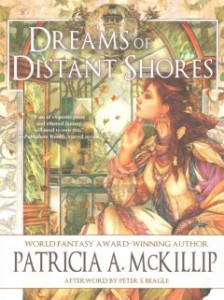 With Dreams of Distant Shores, Patricia A. McKillip delivers something that is not quite your typical short story collection. While the point of entry is a series of shorter pieces, the collection builds to and is anchored by the lengthy novella “Something Rich and Strange,” with an essay on writing high fantasy orthogonal to the usual tropes. The book then ends with appreciation of McKillip’s work (and the stories in the collection) by Peter S. Beagle, an elegant coda to a warm, thought-provoking collection.
With Dreams of Distant Shores, Patricia A. McKillip delivers something that is not quite your typical short story collection. While the point of entry is a series of shorter pieces, the collection builds to and is anchored by the lengthy novella “Something Rich and Strange,” with an essay on writing high fantasy orthogonal to the usual tropes. The book then ends with appreciation of McKillip’s work (and the stories in the collection) by Peter S. Beagle, an elegant coda to a warm, thought-provoking collection.
Certain elements bind the stories together – quirky inhabitants of quirky seaside towns (“Mer” and “Something Rich and Strange”), the difficulty in recognizing inspiration, even when it’s right in front of you (“Which Witch” and “The Gorgon in the Cupboard”), the way simple desires lead us into very deep and dangerous waters (“Edith and Henry Go Motoring” and “Something Rich and Strange”) and younger characters stumbling their way toward the abiding power of ancient female wisdom (pretty much everything except for the jarring opener, “Weird”).
“Alien” is perhaps the standout here, a tale that, depending on how you read it, may or may not have any fantastic elements to it at all, except for the fantastic ways in which even well-meaning love can work at cross-purposes and small gestures can have unforeseen consequences. The narrator’s mother announces she’s been abducted by aliens, her family worries, and a small child does something that’s either the most innocent thing in the world or the thing that drives the aliens away, or both. And at the end, the narrator comes to a realization about what her mother may or may not have seen, and what it means for her, all told in the gentlest realistic style. And it is precisely because the style is so soft-spoken and naturalistic that the implications hit so hard.
“The Gorgon in the Cupboard,” on the other hand, disguises itself as a stylized comedy of manners among the happening artistic set of a mythical city. The protagonist, Harry, is a minor player in the scene, a talented artist whose real muse vanished mid-painting and who’s fixated on another artist’s impossibly ethereal wife. Wacky hijinks ensue when an attempt to revisit the unfinished painting invokes the spirit of the mythical Medusa, whose turn as a sharp-tongues sassy sidekick should be familiar to anyone who’s ever watched a sitcom or a romantic comedy. But balanced against this is the harsh reality of the woman who had originally posed for Harry, now back in the city and in desperate straits, and the way in which slowly dawning realization of her situation serves to unravel the delightful, gauzy illusions of the charmed artists’ circle.
And then there’s “Something Rich and Strange,” in which a longstanding, imperfect but loving relationship is tested by the intrusion of inhuman powers bent on disruption. McKillip doesn’t quite stick the landing here – the setup is so gorgeous that the rationale for all the heartbreak inevitably falls short – but the journey is magnificent, filing the reader with dread for the characters even when the threats are merely hinted at.
The stories alone make this collection worthwhile. The two essays at the end elevate it to even rarer heights. Old fans and new alike will find Dreams of Distant Shores alternately enchanting, thought-provoking, and eminently worth the read.
(Tachyon, 2016)
